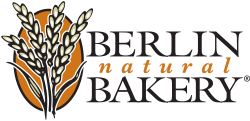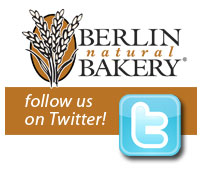Being that we are located in the heart of Amish country, we know what it means to have bread as a staple in our diets and at our dinner tables. We've been raised on it and love it as much as you all do. Since spelt bread is such a cornerstone in all of our lives, we have made it our mission to do the research to find the five essential things everyone needs to know about their beloved daily spelt bread and what makes Berlin Natural Bakery different.
1. What is the actual variety of spelt grain in the bread you consume?
Our spelt grain is of heirloom seed quality. It is a protected variety from Germany to ensure that it is pure. We contract with only small independent farmers strategically located throughout Germany. Only one variety of certified seed is approved to be planted for Berlin Natural Bakery harvesting. The standards are so high and the protection processes are so detailed, that a bag of grain can literally be traced to the field or lot in which it was grown.
2. Is the grain pure or is it crossbred with other modernized wheat grains?
Did you know that the yield of spelt is about 1/3 less than that of wheat? This means that it costs more time, money and energy for farmers to produce and work with pure spelt. In an effort to overcome the many obstacles farmers faced with growing spelt - it seemed like an easy solution to simply crossbreed spelt with wheat. By doing this, it simplified things for them while making the detective work harder for us consumers.
3. Is the grain ground fresh daily on site?
There have been studies coming out over the past few years which state that whole grain flour turns rancid at a rate similar to milk (
1.) This is why we stone grind our flour daily - on site at the bakery. Our flour is not stored for months on end, which means we keep it safe from turning rancid and from attracting unwanted pests.
4. Is the spelt bread you consume mass produced with added ingredients?
Many bread companies add gluten and dough conditioners to their spelt flour in order for it to run efficiently through their machines for mass production. Always check the ingredient label to see if there is any added "gluten." One of the major reasons you may care about this in your ancient grain bread is because of the type of gluten that is probably being added to those products.
If the added gluten is made from modernized/common wheat - would that not defeat the purpose of purchasing ancient grain breads? Would that not be an added concern for people looking to reduce their gluten intake? We know that over the last several decades we, as Americans, have been facing a gluten overload (
4.). This fact could certainly result in an increase in gluten sensitivities. We believe that one of spelt's best qualities is it's extremely fragile and delicate gluten.
Many people find our spelt products to be an invaluable staple in their lives which is why we take every step possible to ensure we provide you with the purest spelt products possible. When you see our ingredient labels, you'll realize that NOTHING is added that you can't easily pronounce - ingredients even your Grandmother would recognize.
Additionally, we bake only small batch breads - literally 100 loaves at a time. We have skilled bakers who oversee the entire small batch baking process to ensure that we produce a quality product every time. The loaf of bread you get from us has not been lost in the shuffle of a large, automated factory.
5. Are the products verified through a 3rd party verification process?
It is certainly no secret that many foods are contaminated with GMOs (genetically modified organisms). Cross pollination, seed swapping with other farmers as well as poor crop rotation standards are just a few of the reasons that a farmer may not honestly know that his crop contains GMOs (
2.). In the US, GMOs are in as much as 80% of conventional processed foods (
3.). This is why 3rd party verification is crucial - the 3rd party will do the investigative work so that we can know that when we eat food with their label that what we eat is GMO free. Berlin Natural Bakery was the very first bakery to be Non GMO Project Verified in the United States and we are certainly proud of it!
The grocery store has most certainly become a battlefield so make sure you know all there is to know about your daily spelt bread so that you are armed with information and questions!
Good luck out there!
References:
- Allbrtitton, Jen (2003) Wheaty Indiscretions: What Happens When Wheat, from Seed to Storage Retrieved at http://www.westonaprice.org/health-topics/wheaty-indiscretions-what-happens-to-wheat-from-seed-to-storage/
- Biello, David (2010) Genetically Modified Crop on the Loose and Evolving in the U.S. Midwest. Retrieved at http://www.scientificamerican.com/article/genetically-modified-crop/
- Non GMO Project (2015) GMO Facts: Frequently Asked Questions. Retrieved at http://www.nongmoproject.org/learn-more/
- Specter, Michael (2014) Against The Grain: Should you Get Gluten-Free? Retrieved at http://www.newyorker.com/magazine/2014/11/03/grain
- HealthyAndNaturalWorld.com (2014) 8 Scary Ingredients You Didn't Know Were in Your Bread. Retrieved at http://www.healthyandnaturalworld.com/scary-ingredients-you-didnt-know-were-in-your-bread/






Comments
0 Comments